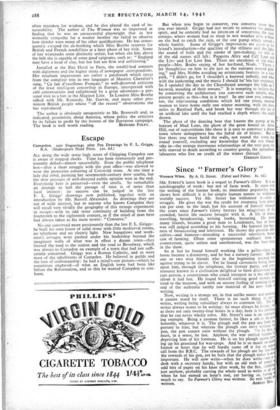Since " Farmer's Glory "
Wessex Wins. By A. G. Street. (Faber and Faber. 8s. 6d.) MIL STREET'S latest book is a sequel to Farmer's Glory. It is an autobiography of work: but not of farm work. It starts with the writing of the former book; its immediate popularity; then shows how difficult it is for simple human nature to withstand worldly success. Yet Mr. Street has withstood it—after a struggle. He gives the war the credit for returning him almost too per cent. to the land; but his account of himself through the years since Farmer's Glory betrays his misgivings of the crowded, hectic life success brought with it. A life of towns, travelling, broadcasting, writing books, lecturing. He made many friends, became a great man to Londoners, but at home was still judged according to his farming. He Idarned the busi- ness of broadcasting and television. He shows the peculiar diffi- culties—and humour—attending a successful television broad• cast of farming. Often some spontaneous outburst from countryman, quite artless and unrehearsed, was the best thin; in the show.
So at last he found himself working like a gal-ley-slave, his home became a dormitory, and he but a cursory farmer. He had one or two wise friends who in the beginning warned hint against trying to be clever. Yet he found cleverness being thrust upon him, through the telephone, the literary party, and ever! resource krtown to a civilisation delighted to have discovered dm rare person, a countryman who could interpret to it the old rural idiom it had lost. He found himself earning good money, tired to the marrow, and with an uneasy feeling of coming to end of the authentic earthy raw material of his new trade of writing. Now, writing is a strange art, in that unlike music and pain: it cannot stand by itself. There is no such thing as just 1 writer, writing being subsidiary always to common life. Yet the writer always wants to be writing: he must always be living: as there are only twenty-four hours in a day, here is his probl that he can never wholly solve. Mr. Street's case is an outst ing example. Being a yeoman farmer, he likes a job to be d honestly, whatever it is. The plough and the pen are both portant to him; but whereas the plough can exist without pen, the pen cannot exist without the plough. To be first. must, in a sense, be last. Anyhow, the war settled matters depriving him of his foreman. He is on his plough again, ing up his grassland for war-crops. And he is so much an dra farmer at heart that he will hardly come off it for an call from the B.B.C. The rewards of his plough are far less the rewards of his pen, yet he feels that the plough today is in important He will now write—when he does write—not desk with a secretary handy, but with an old stub of penci' odd bits of paper on his knee after work, by the fire, snribb just anyhow, probably cursing the whole need to write at all i when he has earned an hour's rest, yet having to, having much to say. So Farmer's Glory was written. So real books






























 Previous page
Previous page